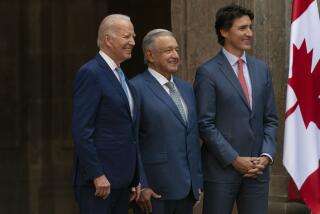A Financial Campaign for Cuba
- Share via
RIO DE JANEIRO — Cuba’s communist lider maximo, Fidel Castro, is grabbing his usual headlines as he works the capitalist crowd at the first-ever European Union-Latin America summit, which formally opened Monday.
The Cuban president is after something more tangible than attention. He is desperately seeking expanded trade and foreign investment from other Latin American and European nations.
But despite sympathy from the many leaders here who share his exasperation with the long-standing U.S. trade embargo against Cuba, there seems little chance of any new pro-Cuba trade initiative here.
Castro couldn’t even persuade the 50-some heads of state to single out the United States in a communique condemning extra-territorial laws, an obvious but unspoken reference to the U.S. Helms-Burton Act that penalizes foreign nations doing any deals with former U.S. firms confiscated by Cuba’s revolutionaries.
At a news conference Monday, Castro called the law “something so loathsome that nobody wants it.” But few European or Latin leaders are siding with Castro, because of his refusal to commit to democratic principles and human rights, a prerequisite for the millions in aid Europe says could be his if only he would liberalize.
The long-running Cuban drama is but one part of the broader hemispheric trade talks that moved a step forward Monday when the European Union and South America’s Mercosur trade bloc formally agreed to open low-level talks this November. That would set the stage for top-level talks in 2001.
For all the noise and ambition, Cuba is a small player in the trade world, and it isn’t getting bigger very fast.
Since Soviet subsidies dried up in 1990, Cuba has transformed itself from a purely socialist state to a strange hybrid of state control but increasing openness to foreign investment, though under some very rigid guidelines.
Cuba has had some success. Its tourism industry is growing at a 20% annual clip, and the island nation is establishing better trade ties with countries such as Spain and Brazil--with which it had no ties at all for a 20-year stretch ending in 1986. Spain is building hotels there, and Brazil’s state-owned oil company, Petrobras, is exploring for oil off Cuba’s north-central coast.
But for all the increased activity, Cuba’s economic prospects are grim. Its short-term outlook has dimmed because of depressed prices for sugar and nickel, its leading exports. And its crumbling infrastructure--energy, transportation and communications--is clouding the outlook for the longer term.
At an energy conference in Rio over the weekend that was held as a parallel event to the summit, Cuba’s Ministry of Basic Industry appealed to foreign investors for help in building $1.3 billion in petroleum and electricity projects.
Cuba’s effort to perform a socialist-capitalist balancing act has been hurt most by a 35-year-old U.S. commercial embargo and, since 1997, by the U.S. Helms-Burton law that penalizes other foreign countries that do business with former U.S. firms confiscated by Castro.
The U.S. embargo, a vestige of the darkest days of the Cold War, forbids all trade between the U.S. and Cuba. It was imposed to isolate and weaken the Soviet-backed Castro. Today it is kept in place largely through the efforts of right-wing Cuban expatriates in Florida.
The U.S. embargo is the biggest reason Cuba has been able to attract only about $2 billion in foreign investment during all of the 1990s, according to Ramon Sanchez-Parodi, Cuba’s ambassador to Brazil and a member of his country’s summit delegation. Brazil, by comparison, currently averages that amount each month.
“I’m sure European companies think about [Helms-Burton] more than once before trading with Cuba. Most businessmen are pretty conservative, after all,” said a Swedish government delegate at the summit.
But Cuba is hopeful that the summit will create a wave of pro-trade sentiment that it can ride. Delegates are expected to approve a 2001 start date for negotiations on a free-trade area embracing Europe and the four Mercosur nations: Brazil, Argentina, Uruguay and Paraguay.
The hope of other Latin American countries--including Cuba--is that such a trade area will expand to include them someday. “This is like a first date. You can’t expect dramatic things,” Sanchez-Parodi said.
But chances of any near-term breakthrough for Castro seem slim. Although officials of several European countries describe the U.S. trade embargo as heavy-handed and counterproductive, there is no “explicit” move afoot at the summit to embrace Castro, said Patricio Leiva Lavalle, former Chilean ambassador to the European Union.
Indeed, the final documents emerging from the summit, which continues through Wednesday, condemned extra-territorial laws but without mentioning Helms-Burton, as Castro had sought.
The European attitude is “against Helms-Burton and the whole attitude of excluding trade with Cuba,” said Rolf Linkohr, a German member of the European parliament, but Cuba will not receive full trade status unless and until it commits to democratic and human rights principles, something Castro has not been willing to do .
Otherwise, Cuba could get some of the $300 million in technology and research aid the EU gives to Latin American nations every year, Linkohr said. Because it helps recipients become more productive, the technical aid often leads to trade, he said.
(BEGIN TEXT OF INFOBOX / INFOGRAPHIC)
Cuba, Si
Uncle Sam’s neighbors and chief trade partners, Canada and Mexico, are leading the investment charge back into Cuba as American firms remain subject to a U.S. trade embargo. Overall foreign investment in Cuba remains small, however. Cuba’s top 10 foreign investors, by country, in millions of U.S. dollars so far in the 1990’s:
Canada: $600
Mexico: $450
Italy: $387
Spain: $100
France: $50
Britain: $50
The Netherlands: $40
Chile: $30
Brazil: $20
Portugal: $10
Source: U.S.-Cuba Trade and Economic Council
More to Read
Sign up for Essential California
The most important California stories and recommendations in your inbox every morning.
You may occasionally receive promotional content from the Los Angeles Times.













